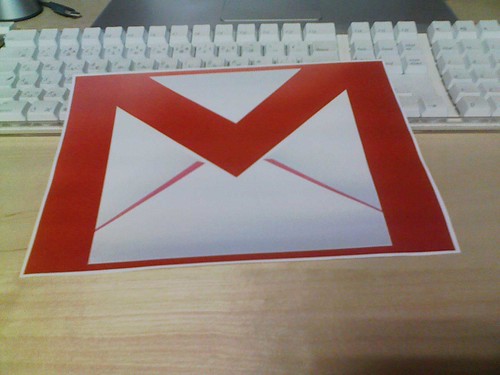
Photo credit: Cinefil on Flickr
The following is also my column in this week's Advertising Age. If you threw me on a desert island (one with internet connectivity) and said that I could use only one website, it would be Gmail.
For the last five years Gmail has become the most indispensable tool in my communications and productivity system. I've even found a full-fledged Twitter client,
Twitgether, that integrates into Gmail.
My use of Gmail is unorthodox in that I also
use it as a massive database -- a backup brain
and more. For years now I have been e-mailing myself articles that I think I might need later. Along the way, Gmail gives me a preview of what the algorithmic, personalized future of advertising and media will undoubtedly resemble.
The 2010s (or "the Tens" as it might be called) will be the Data Decade. Companies that understand how to harness it will win. Those that don't will perish. The same goes for marketers.
The Harvard Business Review highlighted this issue in its recent list of breakthrough ideas for next year: "When a 12-year-old can gather information faster, process it more efficiently, reference more diverse professionals, and get volunteer guidance from better sources than you can at work, how can you pre
tend to be competitive?" wrote Bill Jensen and Josh Klein in the January 2010 issue. The article outlined a bank that was having trouble parsing its massive amounts of data into reports that senior executives could actually use. The breakthrough idea? "Work hacking," or working creatively to get your best data and information.
And that's what Gmail has done. Google has built an ingenious search-advertising business -- it's all about intent. You need to enter a query before you are served with relevant ads. However, over the next decade, trusted sites such as Gmail will have learned enough about us that they will start to surface media, social and advertising content before we even ask. This is why I believe Facebook will succeed wildly. Like Google, they are data-driven, using what they call "the lens of friends" to connect us in real-time with products and services. This was one of Facebook's takeaways from the recent Le Web conference: We increasingly discover online content not just by algorithms but via this lens.
Google understands it's all about data. And Gmail is where you really can see a glimmer of where they will continue to shine in "the Tens" and how all those free services around the search engine will add up to revenues fast. Here's a simple example.
Recently
I became fascinated with the work habits of Thomas Jefferson (a hacker and data geek if there ever was one). I am particularly intrigued by his fondness for
stand-up desks, which are exactly what they sound like. As someone who already sits for much of the day, the thought of standing at the computer instead of sitting when I get home is actually appealing. So I began e-mailing myself articles on the topic that I found on websites. A few days later the little news ticker in my Gmail inbox began to show me ads for stand-up desks, which I have clicked on and have used in my research for what I might end up buying for my apartment.
Think about that: Gmail surfaced high-value information in the form of ads even when I wasn't searching for it. That's an early view of what the Data Decade will look like.









 Young Urban Professional
Young Urban Professional




